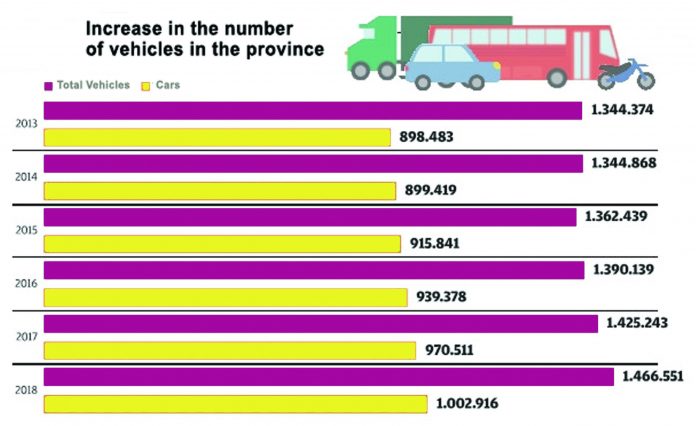The economic recovery and the lack of incentives to scrap old cars has increased the number of cars to in the province of Alicante to record highs. Now exceeding one million cars, the roads are congested even more.
Not even in the economic boom, when the credit flowed unchecked and construction seemed to have no end, did the province have as many cars registered as it does at this time.
According to the latest data from the General Directorate of Traffic, after four uninterrupted years of growth, the Alicante car fleet exceeded one million units last year. At the end of November, 1,002,916 were on the road, a milestone that until now had only been achieved by Madrid, with 3.7 million cars; Barcelona, with 2.4 million and Valencia, with 1.2 million.
However, the total number of vehicles in circulation in the province, including motorcycles, vans, trucks and coaches, is at 1,466,551, the largest number declared by the DGT on its website, which has been in existence since 2008. Although the increase has been generalised in all categories, it is the car that monopolises the greater part of this growth. Specifically, cars and 4×4’s account for 103,497 of the 122,177 vehicles by which the provincial fleet has increased since 2014.
And all this has taken place in a period when absolutely nothing has been done to improve the road network across the province. In fact, in the last five years the only significant improvement has been the Benissa variant of the N-332 and some minor improvements.
You would have thought that, with the acquisition of new vehicles, buyers would scrap their old ones. However, that is precisely what is not happening and what has triggered this significant increase in the number of cars in circulation. “The problem is that there is no help for the scrapping of cars, so most choose to sell their old vehicle on the second hand market to get more out of it,” said Raul Morales, the spokesman of the car dealers’ association Faconauto.
Since the removal of the PIVE Plan in 2016, where the scrapping of old cars was encouraged with a 2000 euro grant, the sector has been demanding some kind of measure to encourage the elimination of older vehicles, but without any success and, according to Morales, until such a measure is reintroduced the number of vehicles on our roads along with congestion and pollution, will continue to grow.





